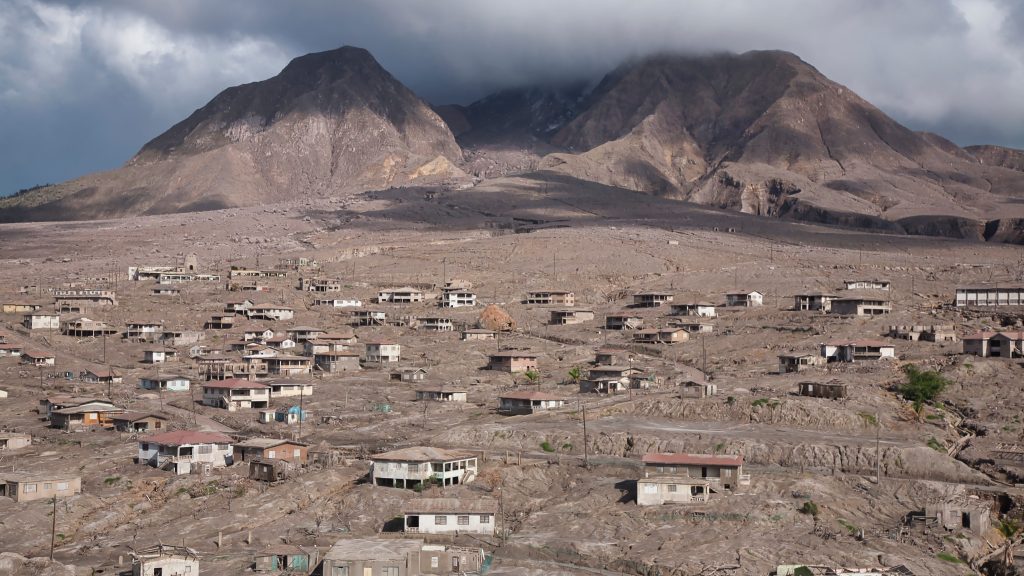Lessons From Montserrat: A PMO In The Shadow Of Volcanoes

Martin Parlett, Head of the PMO for the government of Montserrat, a Caribbean island, recently shared his ‘Lessons in Focus’ for project management offices (PMOs), highlighting that, wherever they may be based, and whatever they may be trying to achieve, the challenges for PMOs across the globe are common.
Parlett, who is responsible for overseeing a portfolio of transformational change on the Caribbean island following a devastating volcanic eruption, was the speaker at a recent PMO Forum event, a quarterly invitation-only interest group falling under the umbrella of Project Management South Africa.
Disasters strike the Caribbean island
Montserrat, which is only 39 square miles in size and one of 14 British Overseas Territories, had been on the brink of returning to self-sufficiency following the destruction wrought by Hurricane Hugo in 1989 – which saw 98 percent of the island’s buildings affected, with entire villages as well as the electrical grid, local hospital, sea port and more destroyed – when disaster struck again, less than 10 years later. This time, it was the eruption of the Soufriere Hills volcano in 1995 that caused chaos and carnage once more.
During this major event, which is said to have changed the fortunes of Montserrat forever, the island’s capital, Plymouth, became a modern-day Pompeii, as inhabitants abandoned homes and shops as-is when the fast-moving cloud of hot ash and rock from the volcano began to rain down.
The volcano’s eruption led to the migration of two-thirds of Montserrat’s population, as well as weakened infrastructure, sluggish economic growth and low tourism numbers. Post volcanic recovery, says Parlett, the island is still unable to generate the revenue needed to run its own affairs, receiving budgetary aid from the UK Government, the European Union (EU), and the UK Caribbean Investment Fund (CIF).
Introducing a portfolio of change for recovery
“Despite the island’s small size, we are facing transformational challenges on an almost inordinate scale, including major infrastructure and non-infrastructure redevelopment. However, on a positive note, Montserrat now has in place an unparalleled portfolio of change, with funding of around $200 million going towards infrastructure and transformational programmes and projects over the next three to five years.”
Projects include a new national hospital for the island, rehabilitation of its airport, subsea fibre options, school development, road replacement, social housing, geothermal development, renewable energy (solar and wind) projects, and a new port.
Facing shared obstacles
Established in 2019, the Montserrat Government’s PMO may have been in existence for only a few years, but the challenges it has faced, Parlett says, will be familiar to anyone within the project and portfolio management space.
“Hurdles overcome by our PMO included a lack of understanding around project, programme and portfolio management, as well as a historical failure to deliver. Multiple programmes had been put in place over the previous 25 years to look at development within Montserrat, but a lack of sponsorship and delivery had hampered results.”
In fact, the previous PMO attempted had collapsed within the first few months, which meant that it was critical for the new PMO to prove its sustainability.
“PMOs are often treated with a level of distrust, especially so in an island context and particularly one that has experienced as much negative change in recent years as Montserrat. The island has undergone a significant amount of trauma, which has had to be carefully navigated, and there was a real resistance to change.
“There is a huge ambition in terms of what Montserrat wants to achieve over the next few years, but this needs to be balanced against the capability and capacity that we have,” Parlett adds. “As with all organisations, we also operate within a very politicised landscape. For us, this includes new government transitions and political elections, where projects become the main centre of debate locally and require great sensitivity in their handling and execution.
“As a small community, the rumour mill is very strong here, something experienced by all organisations to an extent. There are also very uneven requirements across ministries and departments. As in many businesses, some departments are more co-operative, open and mature in their ability to run their projects, and others need more support.”
What were the lessons learnt?
The lessons learnt by the Montserrat PMO, which Parlett believes resonate with other new project offices, include firstly overcoming the ‘new kid on the block’ moniker.
“PMOs are very rarely part of an organisation’s original ecosystem and are often awkwardly straddling different departments and authorities. Furthermore, there’s frequently a lack of budget to establish and work with a PMO. For these reasons, we find that organisations adapt and integrate the PMO, or they can reject and resist you – sometimes both at the same time.
“This demonstrates the importance of showing consistent value, which we’ve had to do from day one. What has been important here for us is the adoption of the existing management language, talking about delivering real human outcomes instead of benefit realisation.”
The second lesson, he explains, is the inconsistency of a PMO in delivering its services. “Defining your PMO’s services and identity is extremely important. However, project offices must be flexible to the need of the context, maturity, character, and the modality of the different projects, programmes and teams it supports. And, because of these strategic inconsistencies and different relationships with all parts of the business, we’ve found that the real skills, like adaptability, emotional intelligence and tactical deftness, are almost as important as technical know-how.”
Lesson number three is the acceptance that there’s no such thing as ‘best practice’. “No framework, process or methodology will be fully adoptable or applicable in your environment,” Parlett explains. “We’ve seen a real drift towards automation, new certificates and software solutions, compounding the appetite for one-stop shopism within the PMO. However, this needs to be balanced with a need to be a differentiator – every PMO should be context driven, based on capacity and the DNA of the business.”
Lesson four is the importance of being both short- and long-termist, which can determine the survivability of a PMO. “PMOs must both deliver in the near term and also provide long-term value, showing early, regular wins, while keeping an eye on the longer-term portfolio benefit and impact. The Montserrat PMO blueprinted its phases and building blocks, describing changes from year to year, and underscoring win-wins to the business.”
The final – and most important – lesson is the PMO’s ability to turn projects into relatable human stories. Says Parlett: “Our experience is that the PMO can really advocate for the human impact of project management. We’ve managed to gain stakeholder buy-in, media interest and sponsorships by turning our milestones, benefits and outcomes into stories of real impact and human consequence.
“Telling these stories, turning attention towards end users and social impact, has been vital for us, in particular in terms of getting our funding partners on board.”
Are you a PMO leader interested in attending the next quarterly PMO Forum event on 12 May 2023? Click here for more information and to register.




